In the exciting world of drones, the best drones for beginners are those that blend simplicity, durability, and affordability. Drones have undeniably become a fun technological trend, opening up a world of possibilities for hobbyists, professionals, and newcomers alike. Still, with the many options available, finding the right beginner-friendly drone can often seem overwhelming.
That’s precisely why we’ve crafted this detailed guide to help you navigate through the multitude of choices, focusing on the best beginner drones suitable for those just beginning their journey into this fun and exciting pass time.
If you’re an aspiring drone pilot aiming to delve into aerial photography, exploration, or even drone racing, the selection process becomes less daunting and much more engaging with our carefully curated list.
Our guide lays out the best drones for beginners, underlining the importance of user-friendly features and sturdy designs that can withstand common beginner errors. We don’t just present you with a list; we delve into the features, advantages, disadvantages, and all the vital information you need to make a well-rounded, educated decision.
Every drone included in our guide comes with advanced features such as GPS-assisted return to home function, an HD camera with a 3-axis gimbal, good flight time and intelligent flight modes.
You’ll find comprehensive insights into why these drones stand out in the market as the best beginner drones, supporting your first steps into this exciting journey.
If the world of drone photography has sparked your interest, or if you’re seeking a thrilling new hobby, let our guide on the best drones for beginners be your stepping stone into this captivating venture.
How I Chose These Beginner-Friendly Drones
Drawing from my personal experience as a drone enthusiast for several years, I have had the opportunity to pilot some of the drones included in this list and have developed a thorough understanding of their functionalities and features.
For the others, I have leveraged extensive research and relied upon the credibility of the companies producing these drones, ensuring they are ideal for beginners.
A significant proportion of the drones featured in this list are from DJI’s entry-level Mini drone series. DJI designed these models with beginners in mind, as well as those operating on a restricted budget.
The technological sophistication of these drones, paired with their user-friendly nature, positions them as outstanding options for those embarking on their drone-flying journey.
While most drones in this compilation fall within the price range of $300 to $800, there is an exception – the final drone (Ryze Tech Tell) on our list costs less than $100.
However, it is important to note that the drones with higher price tags come with advanced technological features, which enhance their ease of operation for beginners.
This selection, although thoroughly curated, is by no means exhaustive.
There are alternative options available in the market, including cheaper drones that still maintain a good balance of ease of use and functionality.
7 Best Drones For Beginners
1. DJI Mini 3 Pro
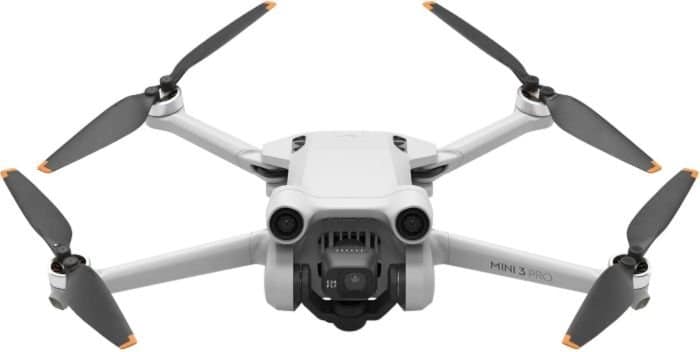
The DJI Mini 3 Pro is one of the best drones for beginners; it’s suitable for those looking for a high-end drone without the huge associated costs. This is an entry-level drone for aspiring drone photographers and comes with many notable features.
With its user-friendly design, this drone offers an exceptional flying experience that caters to both novices and professionals alike.
Weighing less than 249 grams, the Mini 3 Pro is incredibly lightweight and doesn’t require registration with the FAA unless you use it for commercial reasons. Its foldable and compact design makes it highly portable and perfect for adventurers on the move.
Whether you’re embarking on a hike, a beach day, or a spontaneous weekend getaway, this drone is ready to capture breathtaking footage whenever inspiration strikes. One of the standout features of the Mini 3 Pro is its long flight time.
Powered by an intelligent battery, you can enjoy up to 34 minutes of flight time, which is one of the longest flight times for a consumer drone.
You can extend this flight time by purchasing the intelligent plus battery, which provides around 47 minutes, which is very impressive.
When it comes to capturing stunning aerial shots, the Mini 3 Pro excels in all departments. Equipped with a 1/1.3-inch CMOS sensor featuring a large aperture and HDR support, this drone produces images with a higher dynamic range, revealing more details in both highlights and shadows.
The Mini 3 Pro offers exceptional video capabilities, including 4K HDR video and 48MP RAW photos. Whether zooming in for close-ups or slowing down the action with 1080p at 120fps slow-motion video, this drone delivers rich clarity and stunning visuals.
The D-Cinelike Colour mode provides more visual information, allowing for greater colour possibilities and flexibility during editing.
The Mini 3 Pro is equipped with advanced obstacle-sensing technology, including tri-directional obstacle sensing and APAS 4.0. These features detect objects in real time, ensuring a safer flying experience even in complex environments.
The drone also uses DJI’s OcuSync 3.0 technology for a video transmission range of 12km.
Key Features
- The flight time with the standard Intelligent Flight Battery is up to 34 minutes, but with the separately available Intelligent Flight Battery Plus, it can be extended to 47 minutes.
- The drone sports a 1/1.3-inch CMOS sensor that comes with dual native ISO and supports HDR footage output.
- It is capable of capturing 4K HDR videos and 48MP RAW photos and offers a variety of shooting modes, including slow-motion video at 1080p at 120fps.
- Equipped with tri-directional obstacle sensing, the Mini 3 Pro features forward, backwards, and downward dual-vision sensors.
- The DJI Mini 3 Pro uses DJI O3, a top-of-the-line video transmission system that provides a 1080p/30fps live feed at distances up to 12 km for a smooth flying experience.
- The Mini 3 Pro offers a range of intelligent features, such as QuickShots for capturing professional-grade shots with a single tap.
- The drone supports True Vertical Shooting with a 90° rotating camera gimbal for instant social media-ready shots.
Overall, the DJI Mini 3 Pro is suitable for those seeking a powerful and feature-rich drone that doesn’t compromise on quality. Its intuitive controls, impressive flight time, and exceptional imaging capabilities make it the perfect companion for capturing stunning aerial footage and exploring the world from a new perspective.
In my opinion, this is definitely the best drone for beginners with a camera; just watch the stunning 4K video footage below; simply breathtaking.
Pros & Cons
- Lightweight and ultraportable
- Extended flight time with the Intelligent Plus battery
- Impressive image and video quality, including HDR and slow-motion capabilities
- Advanced obstacle-sensing technology for enhanced safety
- A long-range video transmission system
- Higher price compared to other beginner drones.
2. DJI Mini 3
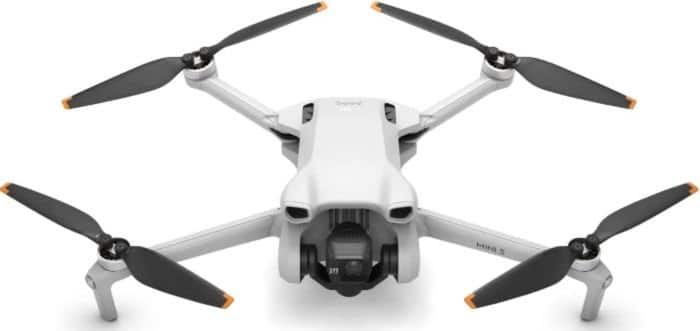 The DJI Mini 3 can be thought of as the lighter version of the Mini 3 Pro, it does not come with some of the features found in the Pro version, but it still is one of the best drones for beginners that is suitable for photography.
The DJI Mini 3 can be thought of as the lighter version of the Mini 3 Pro, it does not come with some of the features found in the Pro version, but it still is one of the best drones for beginners that is suitable for photography.
This superb drone is equipped with a variety of advanced features.
Although these features may not surpass the superior technology found in the Pro version, they certainly outshine the capabilities offered by most other drones within its price range. Thus, the DJI Mini 3 offers excellent value, delivering top-tier technology at a competitive price point.
Main Differences between DJI Mini 3 and DJI Mini 3 Pro:
1. Camera Performance: The Mini 3 Pro offers higher camera specifications with a 48 MP sensor compared to the 12 MP sensor of the Mini 3. It also supports higher frame rates and the H.265 video recording codec, resulting in better image quality and more flexibility during editing.
2. Flight time: The Mini 3 outshines the Mini 3 Pro in flight duration. It offers an impressive 38-minute flight time with a standard battery, which extends to 51 minutes when equipped with the advanced Intelligent Plus Battery.
3. Flight Range and Video Transmission: The Mini 3 Pro features the newer DJI O3 (OcuSync 3.0) transmission system, which provides an extended flight range of 12 KM and a more reliable video transmission with a higher bitrate. In contrast, the Mini 3 utilises DJI O2 (OcuSync 2.0) with a maximum video range of 10 KM.
4. Intelligent Features: The Mini 3 Pro comes with advanced features like ActiveTrack 4.0, Spotlight 2.0, and Point of Interest 3.0, which allow for precise subject tracking and creative shots. It also introduces MasterShots, a feature that automatically generates professional-looking videos with a single tap. These features are not available in the Mini 3.
Key Features
- Compact and lightweight design
- 12 MP camera with a large 1/1.3″ CMOS sensor
- Records 4K videos at 30fps, 2.7K at 60fps and 1080p at 60fps
- Dual native ISO, HDR imaging, and F/1.7 lens for enhanced camera performance
- Flight time of up to 38 minutes (can be extended to 51 minutes with an Intelligent Flight Battery Plus)
- Top speed of 57 KM/h and Level 5 Wind Resistance
- DJI O2 (OcuSync 2.0) for a video transmission range of 10 KM
Pros & Cons
- Brilliant HD camera
- Excellent camera performance with 4K video and 12 MP stills
- Longest flight time for a drone under 250 grams
- Compact and lightweight design for easy portability
- Stable flight performance even in windy conditions
- Long video transmission range
- No obstacle avoidance
- Lack of advanced features like ActiveTrack, POI and MasterShots
3. Autel Evo Nano Plus
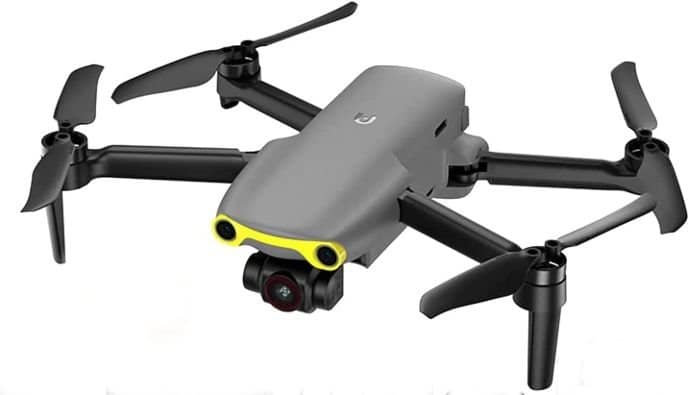 Autel Evo Nano Plus is an exceptional drone choice for beginners looking to explore the world of aerial photography and videography. With its innovative features and user-friendly design, it offers an impressive set of capabilities that will elevate your drone experience.
Autel Evo Nano Plus is an exceptional drone choice for beginners looking to explore the world of aerial photography and videography. With its innovative features and user-friendly design, it offers an impressive set of capabilities that will elevate your drone experience.
The Evo Nano Plus boasts a powerful 1/1.28-inch CMOS sensor, allowing you to capture stunning 50 MP photos with exceptional clarity and detail. The RYYB filter array design, combined with a large aperture of f/1.9, enhances its low-light performance, enabling you to produce high-quality images even in challenging lighting conditions.
The PDAF + CDAF autofocus system ensures precise tracking of fast-moving subjects, while the HDR mode captures multiple photos at different exposures for seamless blending in post-production, resulting in richly detailed images with balanced highlights and shadows.
When it comes to video capabilities, the Evo Nano Plus doesn’t disappoint. It is capable of recording ultra-sharp 4K videos at 30fps.
Weighing only 249 grams, it is highly portable and can be easily carried in a backpack which makes it a great travel accessory.
Despite its small size, it offers advanced obstacle avoidance capabilities, thanks to its three-way binocular vision sensors.
Key Features
- The Evo Nano Plus has a 1/1.28″ CMOS sensor, the largest of any Mini drone
- Comes with an RYYB filter for superior low-light performance
- Its combined PDAF and CDAF system tracks fast-moving subjects for sharp and focused imagery.
- Ultra-clear 4K videos at 30 fps can be recorded for capturing detailed footage.
- The drone’s intelligent SkyPortrait mode allows for automatic airborne photography at the touch of a button.
- The Dynamic Track 2.1 feature enables the Nano Plus to automatically track a person for effortless footage capture.
- Four automatic shooting for one-tap creation of cinematic videos.
- The Evo Nano Plus uses the Autel SkyLink system, offering a transmission range of about 10km.
- Equipped with a three-way binocular vision sensor system, the drone effectively avoids obstacles.
- A single battery charge allows the Evo Nano Plus up to 28 minutes of flight time.
Pros & Cons
- High-resolution 50 MP photos and 4K at 30fps videos for exceptional image quality.
- Impressive low-light performance and dynamic range due to the RYYB colour filter array and HDR mode.
- Compact and lightweight design, making it highly portable.
- Advanced obstacle avoidance system for safe and worry-free flights.
- Limited flight time of 28 minutes.
- The obstacle avoidance system isn't as advanced as the DJI Mini 3 Pro.
4. DJI Mini 2
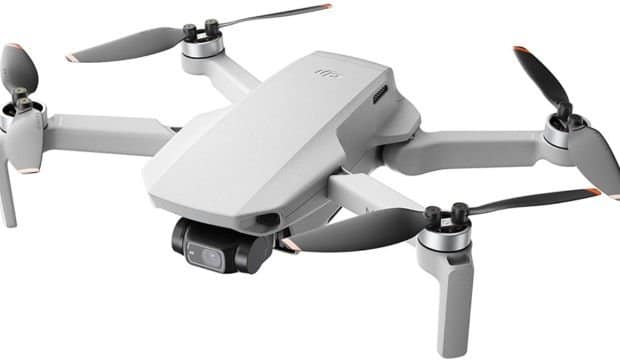 The DJI Mini 2 is one of my favourite drones; it’s probably the best low-cost drone that comes with an actual 4K camera stabilised by a 3-axis gimbal.
The DJI Mini 2 is one of my favourite drones; it’s probably the best low-cost drone that comes with an actual 4K camera stabilised by a 3-axis gimbal.
DJI Mini 2 is a compact and powerful drone that offers exceptional capabilities for beginners and enthusiasts alike. With its lightweight design and advanced features, the Mini 2 is a perfect choice for those who are just starting their drone journey.
The drone sports an HD camera that has a 1/2.3-inch sensor and can capture 12MP still in RAW and record 4K videos at 30fps.
The drone comes with DJI’s innovative Quickshot feature that allows users to capture short HD videos at the push of a button, which is great for beginners. These videos are fun to shoot and excellent to share on social media.
Despite its small size, the Mini 2 doesn’t compromise on performance. It boasts a maximum flight time of 31 minutes, making it one of the best mini drones with the longest flight times.
Another exceptional feature of this drone is its level-5 wind resistance, which allows it to be operated in wind speeds of up to 23mph.
The Mini 2 features OcuSync 2.0 video transmission technology, enabling a reliable and clear HD video feed at distances of up to 10km.
Key Features
- HD camera with a 1/2.3-inch sensor
- Captures 12MP RAW images
- Records HD videos in 4K at 30fps
- Offers up to 31 minutes of flight time
- Supports 10 km HD video transmission via OcuSync 2.0 technology.
- Capable of withstanding level 5 wind conditions.
- Has 4x digital zoom
- Features QuickShots for creative, professional-level videography.
Editors Note
If you are looking for a budget-friendly 4K camera drone that is suitable for beginners, I believe the DJI Mini 2 is the best option, it’s a great drone to fly, and the camera quality is exceptional. Its a few years old but still holds up well against the competition; watch the video below to see the quality of its 4K camera,
Pros & Cons
- Lightweight and portable design.
- Stable flight performance in windy conditions.
- Long-range HD video transmission.
- Cheapest 4K drone
- Compatible with third-party apps like Litchi for intelligent flight modes
- No obstacle avoidance sensors.
- No active track or point of interest smart flight modes.
5. DJI Mini 2 SE
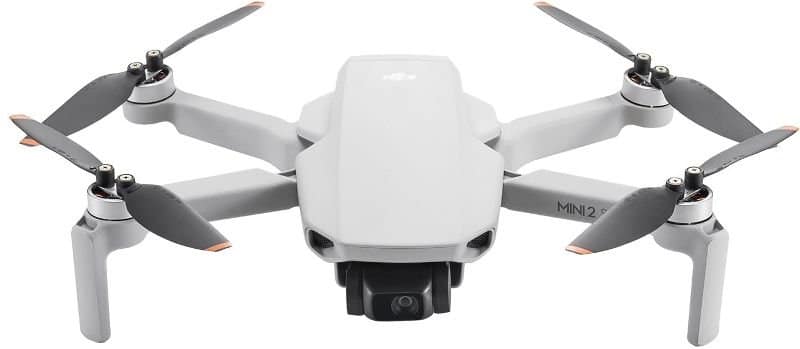 The DJI Mini 2 SE is similar to the DJI Mini 2 without the capability of recording 4K videos; however, this shouldn’t deter you from considering this awesome drone as it comes with many of the same features as the Min 2 but at a cheaper price point.
The DJI Mini 2 SE is similar to the DJI Mini 2 without the capability of recording 4K videos; however, this shouldn’t deter you from considering this awesome drone as it comes with many of the same features as the Min 2 but at a cheaper price point.
The drone uses the OcuSync 2.0 transmission technology for a range of 10km and has an impressive flight time of 31 minutes.
With its robust flying capabilities, the Mini 2 SE can withstand winds up to 23mph (Level 5). This ensures stability and reliability even in windy weather conditions, allowing you to capture smooth and steady footage.
The Mini 2 SE also offers QuickShots, enabling you to capture professional-level videos with just a few taps. Choose from modes like Dronie, Helix, Rocket, Circle, Boomerang, and Panorama to add creativity and flair to your footage. This is one of the best drones for beginners from DJI and comes at an affordable price point.
Key Features
- Captures 12MP images in RAW and JPEG
- 1/2.3-inch CMOS camera for 12MP photos and up to 2.7K videos
- Captures images in both RAW and JPEG formats
- 4x zoom capability
- Comes with Quickshots intelligent video recording mode
- Has a wind resistance of up to 23mph
Pros & Cons
- Beginner-friendly with easy-to-use features.
- Compact and lightweight design for convenient travel and on-the-go use.
- Impressive HD video transmission range for a reliable and clear live feed.
- Long flight time allows for extended aerial exploration
- Stable flight performance even in windy conditions.
- QuickShots feature enables the capture of professional-looking videos effortlessly.
- No 4K video capability
- No obstacle avoidance sensors.
- Not compatible with third-party apps
6. DJI Mini SE
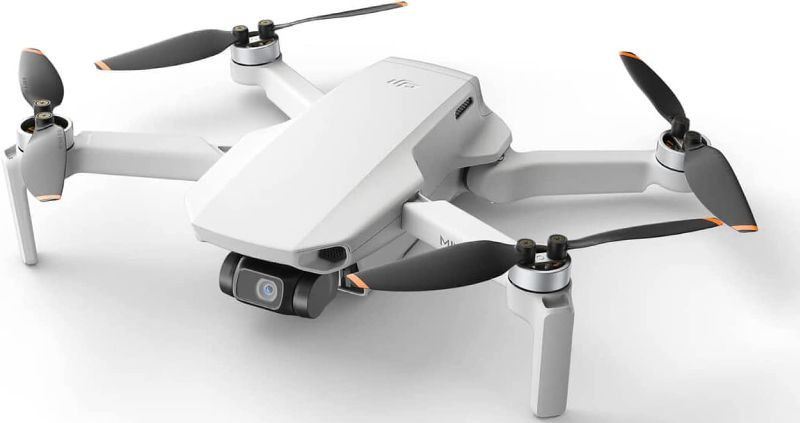 The DJI Mini SE is engineered to be a user-friendly drone that caters specifically to beginners. This compact drone boasts a 30-minute maximum flight time, allowing users to capture extended footage without interruptions.
The DJI Mini SE is engineered to be a user-friendly drone that caters specifically to beginners. This compact drone boasts a 30-minute maximum flight time, allowing users to capture extended footage without interruptions.
The 3-axis gimbal stabilises the 2.7K camera, ensuring smooth and professional-looking shots, while the 4km HD video transmission empowers users to explore far-reaching landscapes and share their adventures in stunning clarity.
Its lightweight design, impressive flight time, and intuitive controls make it a good option for beginners. With its HD camera and compatibility with the DJI Fly app, users can effortlessly capture and create stunning aerial footage.
While it may lack some advanced features found in higher-end models, the DJI Mini SE strikes a balance between performance, affordability, and ease of use, making it a top contender for beginners looking for a high-quality, affordable drone.
Key Features
- HD camera stabilised by a 3-axis gimbal
- Captures 12MP images in JPEG format
- The camera records HD videos in 2.7K at 30fps
- 4 Quickshots for one-tap short video creation
- 31 minutes of flight time
- 4km maximum video transmission range
Pros & Cons
- Lightweight and portable, making it easy to carry and transport.
- High-quality camera and gimbal for stabilised footage.
- Long flight time allows for extended shooting sessions.
- Compatibility with third-party apps like Litchi for additional functionality
- One of the cheapest drones on this list
- Lacks obstacle avoidance sensors
- No support for 4K video recording.
- Lacks intelligent flight modes like follow me and orbit (although these can be accessed with the Litchi app).
7. Ryze Tech Tello
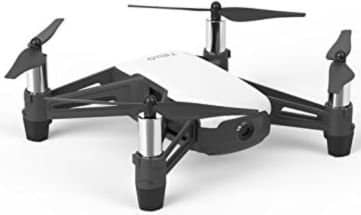 At first, I was hesitant about including the Ryze Tech Tello on this list of the best beginner drones. Its affordable price and relatively basic feature set could seem less impressive when compared to other, more technologically advanced options. However, after giving it some thought, I decided it deserved a place on this list. Despite its simplicity, Tello offers a unique combination of fun and educational aspects that makes it one of the best drones for beginners and kids.
At first, I was hesitant about including the Ryze Tech Tello on this list of the best beginner drones. Its affordable price and relatively basic feature set could seem less impressive when compared to other, more technologically advanced options. However, after giving it some thought, I decided it deserved a place on this list. Despite its simplicity, Tello offers a unique combination of fun and educational aspects that makes it one of the best drones for beginners and kids.
The Tello may seem basic in its offerings, but it’s enjoyable to fly and brings an unexpected learning opportunity. It is integrated with the Scratch programming system, providing a great entry point for those who want to learn about coding and drone technology.
If you are considering Tello, I would like to provide an essential piece of advice: forego the official Tello app. It is far from perfect. Instead, I highly recommend using a more reliable third-party app called TelloFpv. While this app is not free, it dramatically improves your flight experience with its user-friendly interface and dependability.
Key Features
- HD camera with wide FOV
- Captures 5MP images
- Records videos in 720p
- EZ Shots for one-touch video recording
- One-touch aerial flips
- Programmable with Scratch
Pros & Cons
- Small and lightweight
- Suitable for kids and adults
- Electronic image stabilisation
- Allows kids to learn to program and have fun
- Limited range of 100 meters
- Not ideal for flying in mildly windy conditions
- No GPS
Final Thoughts
So, let’s wrap it up. If you’re just starting out and hunting for the perfect beginner-friendly drone, you’ve got some great options. Drones like the DJI Mini 3 Pro, Mini 2, DJI MiniSE, and Ryze Tech Tello are top picks. They’re easy to control, stable in the air, and tough enough to handle a few bumps and crashes, which, let’s face it, are bound to happen when you’re learning.
Best part? These are the best camera drones for beginners – offering cool features at a price that won’t make your wallet cry. So, ready to start your drone-flying journey? These models are waiting to take you up into the skies!
FAQs
What Is The Best Camera Drone For Beginners?
Choosing the best camera drone for beginners can be overwhelming, considering the plethora of options available on the market. While a majority of consumer drones are user-friendly and suitable for novices, the optimal choice significantly depends on factors such as your budget, desired features, and intended use of the drone.
Topping the list of the best camera drones for beginners is the DJI Mini 3 Pro.
This compact yet powerful drone is an ideal pick for those just entering the world of drone photography. Its appeal lies in its affordable price range and the impressive 4K HDR video capture capability, and its range of intelligent features.
The drone is easy to operate and compatible with third-party applications such as Maps Made Easy and Drone Links, the DJI Mini 3 allows beginners to experiment with advanced intelligent flight modes for mapping and 3D modelling.
On the other hand, if your budget is more constrained, but you still prioritise a high-quality camera, the DJI Mini 2 is a fantastic alternative. This drone supports 4K video recording and can capture 12MP RAW images. Despite being released a few years ago, it still stands strong as one of the best camera drones for beginners due to its reasonable price point and excellent functionality.
Will You Need To Register Your Drone?
You will have to consider the rules and regulations regarding flying drones in your country. For example, if you live in the USA, you can fly drones that weigh less than 250g without needing to register the drone. However, you will need to take a safety test called The Recreational UAV Safety Test, also known as TRUST. This test is free to take and is administered by FAA-approved organisations. Click here to find out more about TRUST and how to complete the test.
In the UK, if your drone has a camera you will need to register it by obtaining an Operator ID, even if it weighs less than 250 grams. If the drone weighs more than 250 grams, you will also need to pass an online test and obtain a Flyer ID.
For more details on the rules and regulations regarding flying drones in the UK, please visit the CAA website.


I have been looking at buying a mini drone for some time now. But every time I look, I get overwhelmed. Thanks to your review, I think I’ll go buy one of the beginner drones to get some experience before I go buy a bigger, better one. That way I will know what I want in a better drone. And what I don’t care so much about. Thank you very much for the review. I look forward to searching through the rest of your site.
What a great informational post! I just received a “stunt” drone for Christmas, and I have to say that drones are not just for kids! I am 52 and I am hooked on flying drones! I am a rank beginner and will need lots of practice before I buy a better drone with a camera. I have looked at the ones you recommend and am glad to see the prices are really low! Thanks for the detailed post!
Hi Dave
Thanks for commenting, yes drones are for everyone and I am glad that you found my site informative.
All the best.
I had come across your site a few months ago and based on you recommendation I bought the DROCON U31W Navigator Drone.
It is my first drone and I love it. It was far easier to learn to control than I had first thought it would be.
I could not be happier, thanks for make a great recommendation!
Brendon
Hi Brendon
Appreciate that you purchased from this site and happy that you are finding it easy to fly.
All the best
Hey it’s me back again, left you some feedback for a comment earlier didn’t mean to accident. On the drones you are reviewing, I never owned a drone, but I really like the Syma x5c looks awesome out of all them. Does it have blade guards to go on it? I have got two grandsons that have two mini drones and I like flying them.
Hi Fred
No problem,the Syma X5C is a good choice and yes it does come with blade guards. Its an old drone but still very fun to fly.
All the best
I was looking for a birthday present for my 7-year-old cousin and I thought a drone for a beginner that’s easy to operate would be ideal for him! This gave me all the information I needed and I think I’m going with the Syma X5C. Thanks for your article and found it really helpful!
I’ve been thinking about buying a drone so I am glad I came across your article. I definitely think run time compared to charge time and camera quality would be two of the main concerns when buying a drone.
I have two grand daughters who I would eventually like to buy a drone for and your post has shown me several different options for drones I could look at.
Do you think they will be able to improve the length of flight time in the future?
Hi
Thanks for stopping by and commenting,yes I agree flight time is one area where drones can be improved and is being improved. Most beginner drones will have a short flight time because of their design and technology. The more advanced drones can fly up-to 30 minutes. Still as a drone flyer even 30 minutes isn’t enough,until the drone companies design batteries that can last much longer,I always advise that people purchase extra batteries.
Happy flying and all the best
The quadcopter U818A with the camera sounds like my kind of drone. Currently, I am very curious as to how drones work, and the capabilities of it. This sounds like a good entry drone as I want something that is easy on my wallet for now. What I really like about it is that it has four circular protective rings protecting the propellers. Many years I tried to remotely fly a mini helicopter and I totally obliterated it. Even since then, I was traumatized and refused to buy another toy copter. This drone is at least “cushion” if I accidentally bump it into a tree or something. The fact that it comes with a camera is also a plus. I don’t really want to buy another go pro on top of it when I barely know what I am doing. My question is, does it also do 4k videos?
Drones are so cool! I recently purchased one a year or so ago after doing some research. It was a DJI Mavic Pro. Its not exactly a beginner model, but its a great investment for someone looking for a easy to learn upper model. Before that I had started with one of the beginner models listed on your page and it gave me a really good baseline to know how to upgrade!
I have always wanted to own a drone but was afraid it will be too complex to operate. Believe me, I’ve seen people who flew their drone up the tree and had a hard time retrieving it after that. There are also many varieties out there so I’m not sure which one is the best for beginners like me. Your recommendations are just what I am looking for. The UDI U818A HD looks very cool for its affordable price, will definitely consider that. Thanks a lot for the reviews!
hey there
Drones have also been on my buying list.. it was a good review.. ill definitely consider buying one of them..
I was just apprehensive of the camera quality of the drones.. but I think that drones can also deliver some very good picture quality
enjoyed reading your article
Drones are so fascinating, like a mini helicopter you can control!
I bought my first drone (a very cheap one) about a year ago and it broke so quick. While I had it, it was super fun to play with!
Like when you’re a little kid and you fly kits but this is 10x better! I’ve been planning on buying a new one, thanks for the great suggestions!
Hi Minhaj, I was searching the web for a decent beginners drone for myself and my Son (who is 14) and came across this article. AM definitely going for the Syma X5C as its a great price right now on Amazon considering it has a 720P HD camera . BTW, great article, thank you for sharing.
Thanks for your post. I’m very much into drones, and have tried a few in the past. My friends also own one, which has the cameras attached and you can record, which I think is really cool.
There’s many to choose from on your post which is really good, and do like the look of the Hubsan X4 H107C as it looks cool. I also like that you’ve put the key features on there.
Thanks
informative article minhaj but I have got a unique problem I hope you can give me some guidance on.
I have got three kids that all want to fly drones a the same time in a pretty small area. This mean I either need to buy 3 drones which all operate on difference frequencies (generally not a cheap option) or I need to get the one drone with spare batteries and have them charged up in advance.
Do any of these models have spare batteries available for purchase?
Hi Remy
I would advise buy one of these drones and let them play around with it in turn. Too many drones in confined areas is not safe. Spare batteries can be purchased for the drones on this list and I always recommend people to buy extra batteries because the flight time is never enough. If I were to pick one drone for you to buy fro your kids it would be the Aura drone with gesture control,it will make them feel like super heroes and is a fun drone to fly even for adults.
All the best
I was looking forward t buy a drone for myself but as a person having no actual experience with drones, after all, I didn’t know which one to choose…
Dracon drone seems legit and I love the design of radius protected drones. The price of it is also reasonable. Syma upgraded also seems legit and is suitable for a beginner.
Hello there! I have a nephew and he saw me flying around with my drone. I have a dji phantom 3 and he wants to try flying it. But I don’t want to because he’s young and I don’t want him to destroy my drone. Although I said no, I told him that I will buy him a drone. I will surely buy him the Syma X5C and try to teach him how to fly it. Thank you for sharing this information.
Hi Minhaj!
I was looking at the Tello Drone from DJI/RYZE Tech and had a question:
I do a lot of outside events with my favorite pastime, mud running, and it would be fantastic to have an easy way to do a fly-over of the festival area where the spectators are.
Would the Tello Drone have good enough video with the 720p camera to post the video in a YouTube video? Or would you recommend finding one with 1080p capability?
Thanks so much! Great article!
Hi Michael
The Tello drone has a fantastic camera and will be great for what you are looking to do,however, I must add,since I do not know in which country you reside in,you will have to make sure that you are allowed to record video of places where there is a public gathering.
For more information,refer to this article
All the best
Hi , ace site, thanks for making life easier when it comes to choosing a drone.
Was wondering if you had another supplier for your top recommendation? Tello Drone From DJI/RYZE Tech. As your stockist appears to be out of stock until the end of the month.
I was really impressed with your review of it.
cheers nOrm
Hi Norm
Appreciate the comments,I know of a few places here in the UK that stocks them,you can check these sites out
Argos
Laptops Direct
Toby Deals
John Lewis
If you are in the USA,check out these online stores
WalMart
Best Buy
K-Mart
All the best
Hey Minhaj,
Been actually in the market for a drone for my brother in-law, wanted something nice, but user friendly and of course not too expensive (Seen some crazy ones, but one drop and is over) so wanted him to have some practice first, I decided on the Tello Drone, just wanted to thank you for the recommendations.